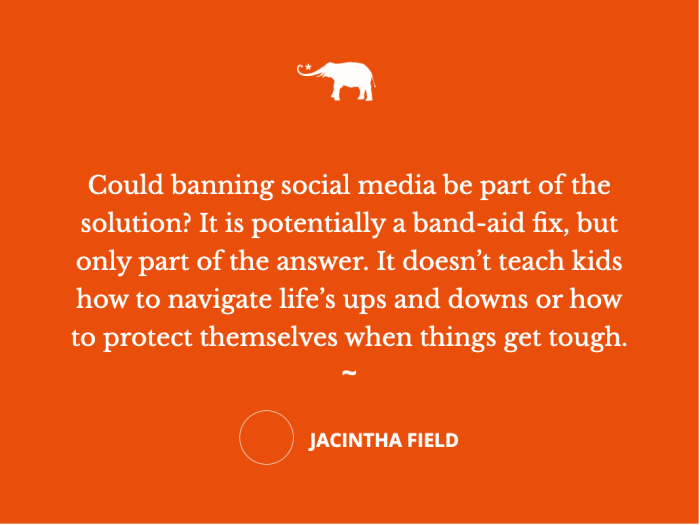View this post on Instagram
Australia’s new ban on kids under 16 from using social media may be good in theory, but on closer inspection, it throws up so many questions.
As a family and child counsellor and a mum, I have seen firsthand the impact of bullying one time too many. I’ve sat with children and parents trying to piece themselves back together after being targeted, both online and in person. Bullying is heartbreaking, but I really don’t believe a blanket social media ban is 100% the solution.
Bullying does not just happen online; it occurs in schools, athletic fields, and even among family members. A social media ban doesn’t give kids the skills or knowledge to deal with bullying, defend themselves, and stand up for what’s right. It merely removes one part of the problem without giving any skills to face the rest.
What kids need are tools, not restrictions.
While banning social media might make it harder for bullies to target kids online, it doesn’t get to the root of the problem. And let’s remember that banning something often makes it more tempting. Kids are clever. Recently, my child managed to add a second face recognition profile to my phone without me even knowing how to do it! They will find a way around this law if they want to. They may create fake profiles, find riskier ways to stay connected, and, in so doing, isolate themselves even further.
I like the idea of a social media ban; it could be part of the solution, but what I’ve learned being a mum is the more we restrict things, the more they want them. A blanket ban may cause secrecy and a lack of trust in a family. Kids often won’t be truthful because they are usually afraid of getting into trouble. I have seen this with my own eyes when we banned Roblox from our house. My child didn’t stop wanting to play it; instead, they found ways around the ban, like going to friends’ houses where it was allowed.
I’ve realised that real education isn’t about banning something; it’s about having real conversations.
I show my child why I believe something isn’t good for them and, just as importantly, listen to their reasons for wanting it. More often than not, their desire to play Roblox isn’t about the game itself—it’s about feeling included. They feel left out when all their friends are playing, and they can’t join in. It’s deeper than a game or a platform. My issue is safety.
As parents, we need to connect and understand. We must build a relationship where our kids feel safe enough to be honest, knowing they can always come to us without judgment or punishment. We must also give them the skills to navigate their challenges, both online and offline. We must teach them to set boundaries, stand up for themselves, and protect their emotional safety. This doesn’t happen through bans but through trust, communication, and guidance, as well as creating a safe place for them to be wholeheartedly themselves.
Social media companies need to up their game.
If they can use algorithms to know what we want to buy before we do, and stalk us the moment our eyes perk up, they should be able to develop programs that reduce bullying and create safer spaces for kids. It blows my mind that they can target our every thought with ads, yet bullies still target kids. The technology is there—they just have to use it for the right reasons.
As parents, we must similarly reflect on our actions. Are we modeling what we want to see in our children? I often catch myself mindlessly scrolling on my phone when I’m tired or stressed. How can I tell my son to get off his screen if I’m glued to mine? If we want our children to have a healthy relationship with technology, we must show them what that means.
Maybe adults need a ban, too?
Could banning social media be part of the solution? It is potentially a band-aid fix, but only part of the answer. It doesn’t teach kids how to navigate life’s ups and downs or how to protect themselves when things get tough. The real solution lies in education, connection, and communication. It’s about helping our kids feel seen, heard, and understood. It’s about giving them the tools to stand tall in a world that often tries to knock them down.
And it first starts with us.
~
 Share on bsky
Share on bsky






Read 0 comments and reply